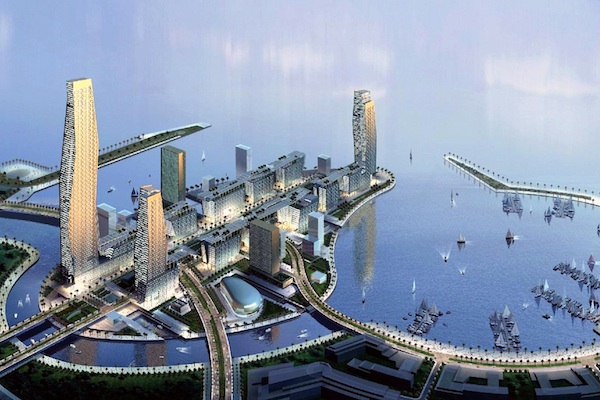The decadence of at least two societies or cultures can be seen in Dave Eggers’ new novel, where some bored Americans wait for weeks in a giant cooled tent in Saudia Arabia for the chance to display the latest innovation in conference IT to King Abdullah at the unbuilt ‘economic city’ that bears his name. Considering current sophisticated video-conferencing and other technology, how vital is it that King Abdullah Economic City (or KAEC, pronounced ‘cake’) be equipped with a hologram device that enables colleagues walking and talking in London to appear to be striding the stage near Jeddah? But perhaps something similar was said about mobile phones 20 years ago.
In any event, the King knows enough not to give the Americans’ hologram more than a few minutes of his time, when, after many false alarms and foreign sightings reported in the press, he does arrive at KAEC for a presentation before rushing away to spend the bulk of his day with the Chinese.
Eggers, known from previous books as a clear-eyed and sensitive observer of embattled civilisations (certainly including America’s), seems sure-footed for every step of this story of a broke and squeezed-out consultant, Alan Clay, who started in manufacturing (bicycles, primarily), until that fell apart in the US, and he began wandering the globe looking for his big score or commission from impatient clients like his current patron, the IT behemoth Reliant.
Of course, the novel is about globalisation. But what sticks is an understated environmentalism or gloom in beholding a progressively uninhabitable planet. It may be pinched human settlements in the kingdom’s desert mountains that prompts a thought that ‘people shouldn’t live here’, but when the thought is expanded to the idea that man’s work is ‘done behind the back of the natural world’, that ‘when nature notices, and can muster the energy, it wipes the slate clean,’ it applies everywhere. Earlier, but on the Red Sea, Earth was ‘an animal that shakes off its fleas when they dig too deep’, that ‘shifts and our cities fall; it sighs and the coasts are overtaken. We really shouldn’t be here at all.’
But people have to live somewhere: Clay, for instance, who will lose his house if he doesn’t earn money, fast; his Saudi driver, Yousef, seemingly urbane, but more of a villager and a primitive than he knows; the cosmopolitan doctor Zahra who removes a cyst from Clay’s neck that he darkly believed must be cancer. For all of these characters, human relationships are or become frayed. Clay, long divorced, writes unsent letters to a daughter he’ll have to withdraw from her expensive college when the bill comes due, and loses an only friend and possibly a lover. Sleep-deprived from the start, he is also losing his mind. He is alternately diffident or insanely ramped-up.
Invoking the Chekhovian principle that an uncovered gun must, in time, be fired, Eggers describes a tragedy almost come down on Clay but averted: ‘Because he hadn’t done anything, for years or ever, he had almost done this.’ In a book striking more than a few notes of Beckett, from its epigraph (‘it is not every day that we are needed’) to the waiting around that is a permanent state of being, Clay’s hovering between doing something and doing nothing, resolved in nearly doing something truly terrible, seems almost like mankind’s last gasp.






Comments